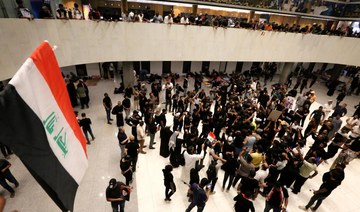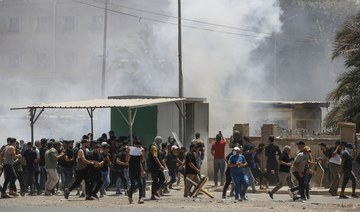BAGHDAD: Thousands of Iraqis took to the streets of Baghdad Monday in counter-protests as rival supporters of Shiite Muslim cleric Moqtada Sadr extended their occupation of parliament into a third day.
Almost 10 months after Iraqis went to the polls, a political standoff pits two key factions of the Shiite political scene, between the populist Sadr with a devoted following of millions, and the powerful pro-Iran Coordination Framework.
“The people will not allow a coup,” read placards held by supporters of the Coordination Framework as they gathered on a main street leading to the Green Zone, the home of parliament, which Sadr’s supporters have been occupying since Saturday.
“It is the parliament of the people, of all Iraqis, not the parliament of a select group,” said 25-year-old protester Ahmed Ali, condemning “the storming” of government institutions.
Police fired water cannon at crowds in a bid to prevent them from crossing a bridge leading to the Green Zone, inside which thousands of Sadr supporters maintained their protests, waving flags and carrying placards of their leader.
Sadr’s supporters on Saturday breached the normally high-security Green Zone — also home to government buildings and embassies — in protest at a prime ministerial nomination by the Coordination Framework.
Followers of the Coordination Framework urged supporters not to enter the Green Zone, saying their objective was to “defend the state and its legitimacy.”
After some two hours, the counter-demonstration announced they were dispersing.
“They wanted to show their political strength, to show that they too have a base that can take over the Iraqi street,” said political scientist Ihsan Al-Shammari, from the University of Baghdad.
In multi-confessional and multi-ethnic Iraq, government formation has involved complex negotiations since a 2003 US-led invasion toppled dictator Saddam Hussein.
In this case, the protracted political deadlock has left the country without a government, a new prime minister or a new president.
Sadr’s massive mobilization of supporters in recent weeks has underscored the political clout of the firebrand preacher.
The Coordination Framework alliance includes lawmakers from the party of Sadr’s longtime foe, ex-prime minister Nuri Al-Maliki.
It also represents the powerful pro-Iran former paramilitary alliance Hashed Al-Shaabi, now integrated into the regular forces.
Hadi Al-Ameri, who heads a faction of the Hashed, repeated a call Monday for “constructive dialogue” and warned against “an atmosphere of media escalation, sparked by statements and counter-statements calling for mass mobilizations that could get out of control and lead to violence.”
Iranian foreign ministry spokesman Nasser Kanani said Tehran respects “the choice of the Iraqi people,” and that “dialogue is the best way to solve the internal problems of Iraq.”
Sadr’s 73 lawmakers had made up the biggest group of parliament’s 329 lawmakers, but they were unable to cobble together a government.
In June they quit, a move that made their pro-Iran rivals the largest bloc in the legislature.
But the Sadrist camp was outraged by the Coordination Framework’s recent nomination of former minister Mohammed Shia Al-Sudani for premier, prompting them to occupy parliament.
On Sunday, the mercurial Sadr called on “everyone... to support the reformist revolutionaries.”
The Coordination Framework described the appeal as “a call for a coup against the people, the state and its institutions.”
Followers of Sadr also held rallies in the southern cities of Basra, Kut and Nassiriya on Monday.
“Here are the soldiers of the sons of the sayyed,” Sadr’s supporters shouted in the parliament’s entrance hall, using an honorific reference to the preacher, who wears a black turban symbolic of a descendant of the Prophet Muhammad.
“We want to get rid of the government of the corrupt,” said protester Zaher Al-Atabi. “From 2003 until now, those who have run the country have done nothing to develop public services, no health system, no education.”
But while the cleric’s supporters see him as cracking down on graft, Sadrist supporters hold posts at the highest levels of government ministries — and opponents accuse them of being just as corrupt as Iraq’s other political forces.
Iraq tensions soar as protesters rally against parliament occupation
https://arab.news/y3zr4
Iraq tensions soar as protesters rally against parliament occupation
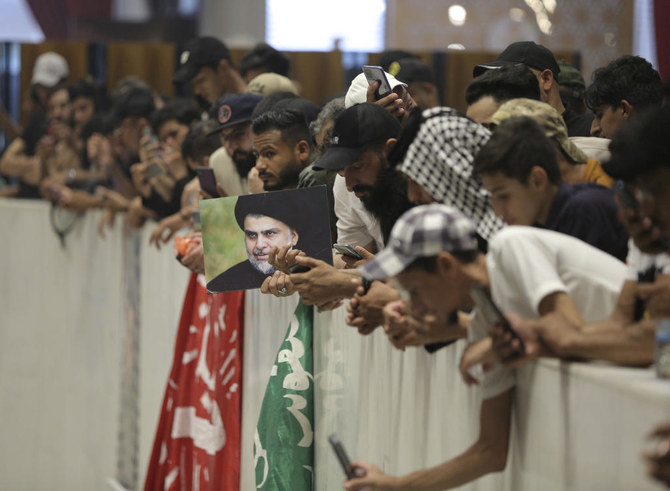
- Sadr’s supporters on Saturday breached the Green Zone in protest at a prime ministerial nomination by the Coordination Framework
- Iraq’s longest post-election deadlock has led to unrest
flydubai airline cancels flights to Iran: statement

- Flight-tracking software shows commercial flights avoiding western Iran, including Isfahan, and skirting Tehran to the north and east
“In line with the issued NOTAM (notice to air missions), our flights to Iran today have been canceled,” said the statement sent to AFP.
One flight which had already departed for Tehran returned to Dubai after the Iranian capital’s airport was closed, it added.
Flights were suspended across swathes of Iran as Iranian state media reported explosions in the central province of Isfahan.
Flight-tracking software showed commercial flights avoiding western Iran, including Isfahan, and skirting Tehran to the north and east.
There was no immediate comment from Dubai’s state-owned Emirates airline, flydubai’s sister carrier, which was operating several of the planes.
Emirates and flydubai have experienced serious disruption this week after record rainfall caused more than 1,000 flight cancelations at Dubai airport, one of the world’s busiest air hubs.
Iran closes air space, commercial flights diverted after apparent Israeli retaliatory strikes

- Drones shot down over Isfahan, says Iranian state media
- Israel military refuses to comment on incident
DUBAI/WASHINGTON: Israeli missiles have hit a site in Iran, ABC News reported late on Thursday, citing a US official, while Iranian state media reported an explosion in the center of the country, days after Iran launched a retaliatory drone strike on Israel.
Commercial flights began diverting their routes early Friday morning over western Iran without explanation as one semiofficial news agency in the Islamic Republic claimed there had been “explosions” heard over the city of Isfahan.
Some Emirates and Flydubai flights that were flying over Iran early on Friday made sudden sharp turns away from the airspace, according to flight paths shown on tracking website Flightradar24.
“Flights over Isfahan, Shiraz and Tehran cities have been suspended,” state media reported.
Iranian officials said its air defenses did shot down several drones but there had been “no missile attack for now” on the country.
The state-run IRNA news agency reported that Iran fired air defense batteries early Friday morning across several provinces after reports of explosions near the city of Isfahan.
Several drones “have been successfully shot down by the country’s air defense, there are no reports of a missile attack for now,” Iran’s space agency spokesman Hossein Dalirian says on X.
The Fars news agency said “three explosions” were heard near the Shekari army airbase near Isfahan.
Iran’s local media also reported that nuclear facilities in Isfahan were “completely secure” after explosions were heard near the area.
“Nuclear facilities in Isfahan province are completely secure,” Tasnim news agency reports, quoting “reliable sources.”
Israel had said it would retaliate against Iran’s weekend attack, which involved hundreds of drones and missiles in retaliation for a suspected Israeli strike on its embassy compound in Syria. Most of the Iranian drones and missiles were downed before reaching Israeli territory.
Several Iranian nuclear sites are located in Isfahan province, including Natanz, centerpiece of Iran’s uranium enrichment program. Isfahan, Isome 350 kilometers (215 miles) south of Iran’s capital, Tehran, is also home to a major air base for the Iranian military.
Meanwhile in Iraq where a number of Iranian-backed militias are based, residents in Baghdad reported hearing sounds of explosions, but the source of the noise was not immediately clear.
In Syria, a local activist group said strikes hit an army position in the south of the country Friday.
“There were strikes on a Syrian army radar position,” said Rayan Maarouf, who runs the Suwayda24 anti-government website that covers news from Sweida province in the south.
Iranian military positions in Syria had been frequently targetted by Israeli air strikes over the past years. Early this month, an Israeli strike demolished a consular building annex of the Iranian Embassy in Sydia's capital Damascus, killing 13 people, including two generals of Iran's Revolutionary Guards, triggering the Iranian missiles and drones attack on Israel on April 13.
At the United Nations Security Council on Thursday, Iran urged member nations that Israel “must be compelled to stop any further military adventurism against our interests” as the UN secretary-general warned that the Middle East was in a “moment of maximum peril.”
Israel had said it was going to retaliate against Iran’s April 13 missile and drone attack.
Analysts and observers have been raising concerns about the risks of the Israel-Gaza war spreading into the rest of the region.
Oil prices and jumped on the reports of the Israeli strike. Brent crude futures rose 2 percent to $88.86 a barrel, the dollar gained broadly, gold rose 1 percent and S&P 500 futures dropped 1 percent.
Israel’s assault on Gaza began after Palestinian Islamist group Hamas attacked Israel on Oct. 7, killing 1,200, according to Israeli tallies.
Israel’s military offensive has killed over 33,000 Palestinians in Gaza, according to the local health ministry.
Iran-backed groups have declared support for Palestinians, launching attacks from Lebanon, Yemen and Iraq.
Iran closes air space, commercial flights diverted after apparent Israeli retaliatory strikes
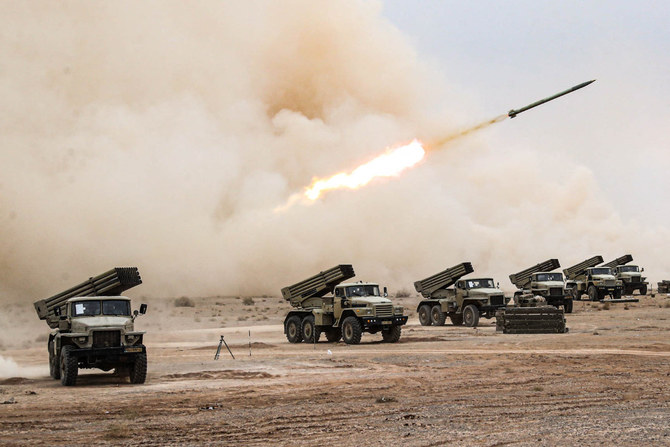
- Drones shot down over Isfahan: Iranian state television
- Israel military refuses to comment on incident
DUBAI/WASHINGTON: Israeli missiles have hit a site in Iran, ABC News reported late on Thursday, citing a US official, while Iranian state media reported an explosion in the center of the country, days after Iran launched a retaliatory drone strike on Israel.
Commercial flights began diverting their routes early Friday morning over western Iran without explanation as one semiofficial news agency in the Islamic Republic claimed there had been “explosions” heard over the city of Isfahan.
Some Emirates and Flydubai flights that were flying over Iran early on Friday made sudden sharp turns away from the airspace, according to flight paths shown on tracking website Flightradar24.
“Flights over Isfahan, Shiraz and Tehran cities have been suspended,” state media reported.
Iranian officials said its air defenses did shot down several drones but there had been “no missile attack for now” on the country.
The state-run IRNA news agency reported that Iran fired air defense batteries early Friday morning across several provinces after reports of explosions near the city of Isfahan.
Several drones “have been successfully shot down by the country’s air defense, there are no reports of a missile attack for now,” Iran’s space agency spokesman Hossein Dalirian says on X.
The Fars news agency said “three explosions” were heard near the Shekari army airbase near Isfahan.
Iran’s local media also reported that nuclear facilities in Isfahan were “completely secure” after explosions were heard near the area.
“Nuclear facilities in Isfahan province are completely secure,” Tasnim news agency reports, quoting “reliable sources.”
Israel had said it would retaliate against Iran’s weekend attack, which involved hundreds of drones and missiles in retaliation for a suspected Israeli strike on its embassy compound in Syria. Most of the Iranian drones and missiles were downed before reaching Israeli territory.
Several Iranian nuclear sites are located in Isfahan province, including Natanz, centerpiece of Iran’s uranium enrichment program. Isfahan, Isome 350 kilometers (215 miles) south of Iran’s capital, Tehran, is also home to a major air base for the Iranian military.
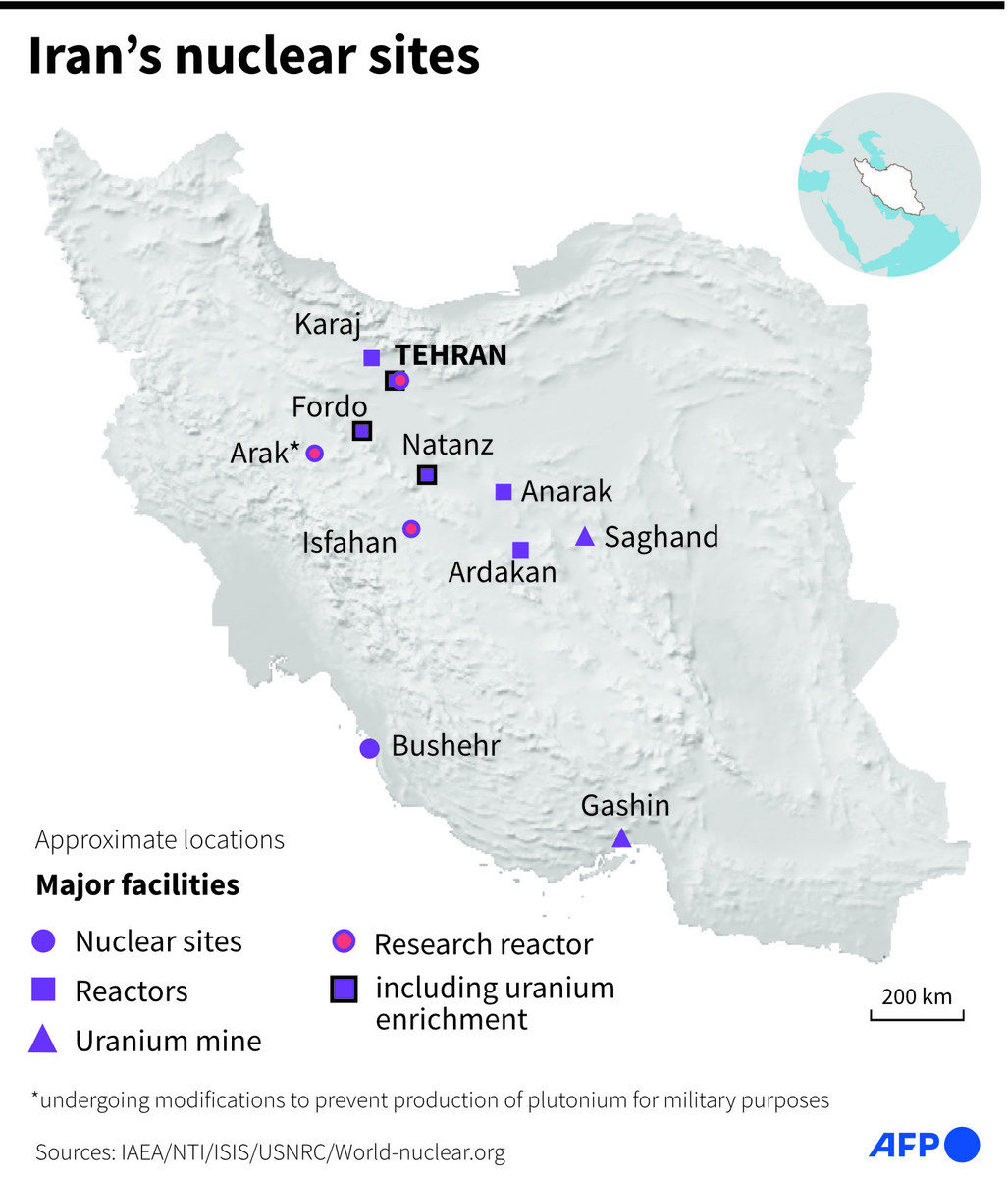
Meanwhile in Iraq where a number of Iranian-backed militias are based, residents in Baghdad reported hearing sounds of explosions, but the source of the noise was not immediately clear.
In Syria, a local activist group said strikes hit an army position in the south of the country Friday.
“There were strikes on a Syrian army radar position,” said Rayan Maarouf, who runs the Suwayda24 anti-government website that covers news from Sweida province in the south.
Iranian military positions in Syria had been frequently targetted by Israeli air strikes over the past years. Early this month, an Israeli strike demolished a consular building annex of the Iranian Embassy in Sydia's capital Damascus, killing 13 people, including two generals of Iran's Revolutionary Guards, triggering the Iranian missiles and drones attack on Israel on April 13.
At the United Nations Security Council on Thursday, Iran urged member nations that Israel “must be compelled to stop any further military adventurism against our interests” as the UN secretary-general warned that the Middle East was in a “moment of maximum peril.”
Israel had said it was going to retaliate against Iran’s April 13 missile and drone attack.
Analysts and observers have been raising concerns about the risks of the Israel-Gaza war spreading into the rest of the region.
Oil prices and jumped on the reports of the Israeli strike. Brent crude futures rose 2 percent to $88.86 a barrel, the dollar gained broadly, gold rose 1 percent and S&P 500 futures dropped 1 percent.
Israel’s assault on Gaza began after Palestinian Islamist group Hamas attacked Israel on Oct. 7, killing 1,200, according to Israeli tallies.
Israel’s military offensive has killed over 33,000 Palestinians in Gaza, according to the local health ministry.
Iran-backed groups have declared support for Palestinians, launching attacks from Lebanon, Yemen and Iraq.
Hamas slams US veto of Palestinian UN membership bid

PALESTINIAN TERRITORIES: Palestinian militant group Hamas condemned on Friday the US veto that ended a long-shot Palestinian bid for full United Nations membership.
“Hamas condemns the American veto at the Security Council of the draft resolution granting Palestine full membership in the United Nations,” the Gaza Strip rulers said in a statement, which comes amid growing international concern over the toll inflicted by the war in the besieged Palestinian territory.
The veto by Israel’s main ally and military backer had been expected ahead of the vote, which took place more than six months into Israel’s offensive in Gaza, in retaliation for the deadly October 7 attack by Hamas militants.
Twelve countries voted in favor of the draft resolution, which was introduced by Algeria and “recommends to the General Assembly that the State of Palestine be admitted to membership of the United Nations.” Britain and Switzerland abstained.
Gazans search for remains after deadly Rafah strike

An Israeli strike hit the home where a displaced Palestinian family was sheltering in the southern city of Rafah, relatives and neighbors told AFP as they scraped at the soil with their hands.
Al-Arja said the blast killed at least 10 people.
“We retrieved the remains of children and women, finding arms and feet. They were all torn to pieces.
“This is horrifying. It’s not normal,” he said, hauling concrete and broken olive branches from the wreckage. “The entire world is complicit.”
Soon after the war began on Oct. 7, Israel told Palestinians living in the north of Gaza to move to “safe zones” in the territory’s south, like Rafah.
But Israeli Prime Minister Benjamin Netanyahu has since vowed to invade the city, where around 1.5 million people live in shelters, more than half the territory’s population.
“How is Rafah a safe place?” said Zeyad Ayyad, a relative of the victims. He sighed as he cradled a fragment of the remains.
“I heard the bombing last night and then went back to sleep. I did not think it hit my aunt’s house.”
The search for remains was long and painful. The strike left a huge crater and children picked through the rubble while neighbors removed debris, tarpaulin, a pink top.
“We can see them under the rubble and we’re unable to retrieve them,” Al-Arja said.
“These are people who came from the north because it was said the south is safe.”
“They struck without any warning,” he said.
In a separate strike on the house in Rafah’s Al-Salam neighborhood overnight on Tuesday, rescue crews recovered the corpses of eight family members, including five children and two women, Gaza’s civil defense service said.
“An Israeli rocket hit a house of displaced people,” said resident Sami Nyrab.
“My sister’s son-in-law, her daughter, and her children were having dinner when an Israeli missile demolished their house over their heads.”



